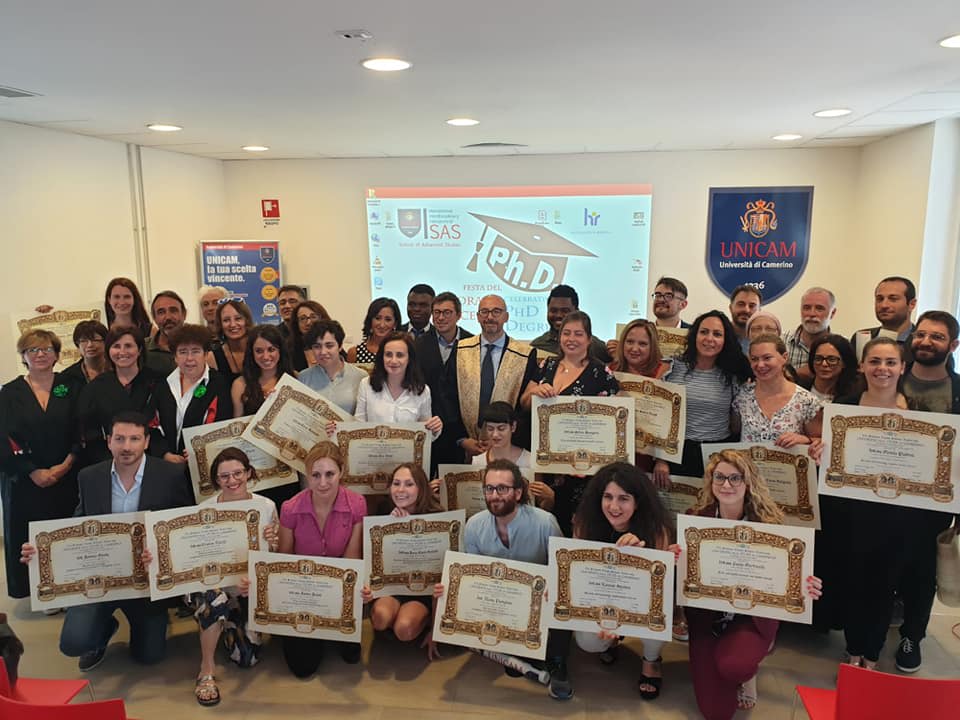
Ph.D. in Chemical and Pharmaceutical Sciences and Biotechnology
University of Camerino the international School of Advanced Studies

Key Information
Campus location
Camerino, Italy
Languages
English, Italian
Study format
On-Campus
Duration
3 years
Pace
Full time
Tuition fees
Request info
Application deadline
Request info
Earliest start date
Request info
Introduction

Area: Chemical and Pharmaceutical Sciences and Biotechnology
- Chemical Sciences
- Pharmaceutical, Nutraceutical, and Food Sciences
Ph.D. Course in Chemical Sciences
The main objective of the PhD Course in Chemical Sciences is to offer the opportunity of being part of scientifically stimulating research teams in order to train professionals prepared for research activities in all the innovative fields involving chemical processes, ranging from organic synthesis to material development, from applications to analyses, and from chemical characterizations to assessment of food quality.
During the three years Ph.D. course, the students will have personal mentors who educate them to follow research topics, with the goal to allow the students to become able to formulate a scientific problem independently, propose hypotheses and procedures leading to its solving on an experimental or theoretical level in the different fields of Chemical Sciences. The main research topics are in analytical and environmental chemistry, food chemistry, inorganic chemistry, and organic chemistry:
- The research in analytical and environmental chemistry includes the feasibility of CH4-CO2 replacement in marine Natural Gas Hydrate sediments, the synthesis and characterization of nanocomposite functional materials for Li-ion and Na-ion batteries and absorbent/photoactive nanomaterials for energy and environmental applications. Further researches are related to diagnostic methods for characterization, conservation and restoration of cultural heritage, the immobilization technics of dangerous wastes in inorganic polymeric matrices, the chemometric data sets elaboration, and the samples preparation and analysis for the speciation of particular pollutants and analytes in different environmental matrices.
- The primary field of food chemistry research is the assessment of food quality by means of development and application of new methods to identify and quantify both new and classical chemical markers and investigating reactions and compositional changes occurring in food during cooking, processing, and storage.
- The research in inorganic chemistry covers several important areas of chemistry such as coordination chemistry, organometallic chemistry, metal-based drugs, metals in medicine and in biological processes, catalysis, porous coordination polymers, MOFs, and functionalized nano-materials. The main topics focus on: a) design and synthesis of new ligands characterized by the presence of C-, N-, O-, P- and S-donor groups; b) evaluation of their coordination capabilities with main group and late transition metal ions; c) applications in medicinal inorganic chemistry, in the field of composite materials, in catalysis and as materials for optoelectronics.
- The research in organic chemistry is organized around the following areas: catalytic processes for organic reactions; synthetic organic chemistry, focusing on key reactions in the synthesis of a variety of bioactive compounds including organic molecules having pharmacological importance; organic transformations using new sustainable processes by the use of unconventional methods for preparing highly functionalized organic molecules; organic surface chemistry focusing on modification of surfaces using organic molecules to create coatings and materials with controllable properties.

Due to the active scientific collaborations present in the Chemistry Center of the University of Camerino, the Ph.D. students are strongly encouraged to attend part of their activities in other research groups in Italy and abroad. For this reason, the ability to communicate in English, both verbally and in written form, is a mandatory requirement for Ph.D. students.
Ph.D. Course in Pharmaceutical, Nutraceutical and Food Sciences
The main goal of this Ph.D. program is to involve Ph.D. students in stimulating research activities in the fields of drug design, rationale synthesis, in vitro and in vivo pharmacological studies, drugs and cosmetics formulation and delivery, food quality and safety, food supplements and nutraceuticals, analytical and biological studies on plant extracts.
During the three years Ph.D. course, the students will have personal mentors who educate them to follow research topics, with the goal to allow the students to become able to formulate a scientific problem independently, propose hypotheses and procedures leading to its solving on an experimental or theoretical level in the above different fields.
The general concept behind all the research activities listed above is related to human health and well-being. Research activities will be related to computer assisted drug design and optimization; synthesis of potential drugs with different synthetic approaches and instrumental characterization; isolated macromolecules, cell tissues and animal pharmacological studies; novel strategies for drug delivery systems; new formulations, mainly based on natural ingredients, for cosmetics; in deep quali-quantitative analytical studies of foods; development of functional food and food supplements, mainly based on nutraceutics; analytical studies and biological properties of essential oils and solvent extracts from plants.